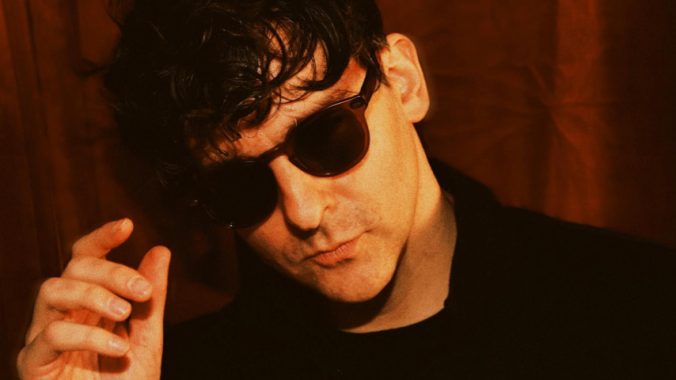Low Cut Connie’s Adam Weiner: Flipping the Switch
Photo by Shervin Lainez (Courtesy of Missing Piece Group)
Art Dealers is the title of both the recently released Low Cut Connie studio album and the forthcoming documentary movie about the band. Though some songs are in both, those in the former are all studio versions, while those in the latter are all live versions.
The first thing you see in the movie is the band’s front man Adam Weiner, sitting in a diner, wearing a black fleece jacket with his signature dark curls drooping over his forehead. “I’m shy,” he tells filmmaker Ray Power, “very shy. I’m very square, a very boring person.”
Before long, though, the movie captures him in a crowded, sweaty New York City nightclub, his denim jacket open over a torn-apart undershirt, one boot on the piano bench, one boot stretched out behind him like a weathervane, as he pounds rock ‘n’ roll triplets on the keyboard and hollers, “Mama, Mama, Mama, tell me I’m a good-for-nothing; tell me I’m a real big boy.”
Was he lying about being shy? Was he joking? Not at all. He’s just the latest example of that show-business staple: the performer who’s quiet and withdrawn offstage but who transforms into a boisterous attention-getter, a charismatic magnet whenever he or she steps into the halo of the spotlight and the bubble of the crowd’s roar. In the dressing room, Weiner is one way. When he grabs the mic, he’s another.
“It feels very natural,” Weiner says over the phone from his South Philly home. “It’s a switch that flips on. There are a lot of performers like me who are rather introverted. Prince was shy; Elvis was shy—David Bowie, Patti Smith. They’re shy, but you see them perform, it’s like a thousand firecrackers going off at once. It’s like we conserve energy offstage, so we have more energy when we’re onstage. Some of my fans are disappointed when they discover how boring I am in real life. They expect me to be that outgoing, over-the-top guy all the time.”
He’s nervous when the stakes are low, calm when they’re high. In October, for example, he was invited to perform at Monmouth University. Bruce Springsteen was being interviewed there, and once the interview ended, they wanted Weiner to sing Springsteen’s “Incident on 57th Street.” “It’s a long, complicated song,” he recalls, “and he’s there on stage watching me. It should have nerve-wracking, but it felt easy. The moments that most people would find the most difficult, I find the easiest. I’m at ease on stage as I am nowhere else.”
What makes this possible? Well, it’s an entirely different dynamic when the lights are on you and the listeners are in the dark, when you’ve got a microphone that makes you louder than everyone else, when you’ve got an audience that’s willing, even eager to be entertained. That’s not like most interactions when you’re face-to-face with someone who can interrupt or rebut you. On stage, the singer has the license to drown out and overwhelm every heckler and naysayer.
“I’m a person with certain kinds of anxieties and nervousness that are amplified offstage and turned down onstage,” Weiner confesses. “Some people who are very gregarious and outgoing clam up when you put a mic in front of them. I’m the complete opposite. Art has been a great vehicle for bringing out this part of me.”
Weiner first discovered this magic trick when he was a student at Cherry Hill High School East in the Jersey suburbs of Philadelphia. He was the kind of withdrawn, weird kid who got bullied by everyone but his handful of artsy friends. But he had a little rock ‘n’ roll band, and they entered the school’s Battle of the Bands.
“I don’t know why,” he remembers, “but in the middle of a song, I shouted, ‘If you scream loud enough, I’ll take my shirt off.’ They did, and I did. Soon everyone in school was saying, ‘Who is this kid?’”
At first he misinterpreted the event. He thought he wanted to pretend he was someone else. So after high school, he moved to New York to become an actor. But he soon realized he didn’t want to speak someone else’s words; he didn’t want to be someone else. He wanted to be himself as he had never been before. He got a job playing piano in Manhattan’s gay bars, where it took a lot of work to be more entertaining than the clientele.
-

-

-

-

-

-

-

-

-

-

-

-

-

-

-

-

-

-

-

-

-

-

-

-

-

-

-

-

-

-

-

-

-

-

-

-

-

-

-

-








































